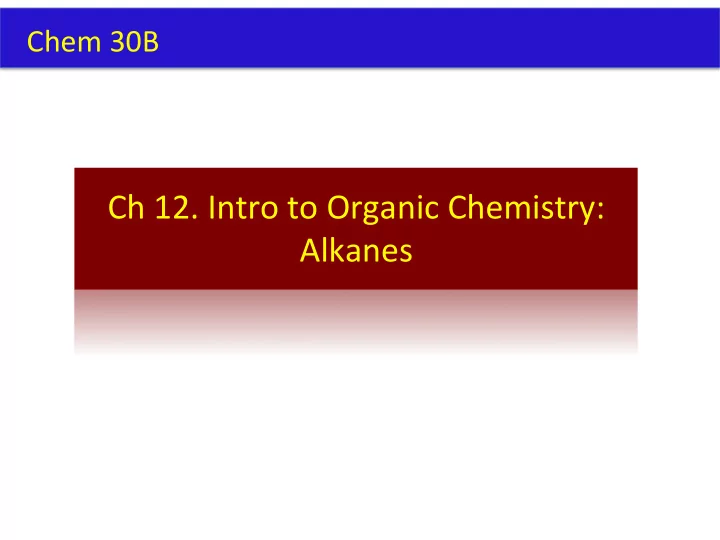

Chem 30B Ch 12. Intro to Organic Chemistry: Alkanes
What is Organic Chemistry? • Organic Compounds: Contain carbon as primary component. (Contain C-H bond.) § Biological molecules (proteins, nucleic acids, carbohydrates, lipids) § Many modern materials (plasHcs, syntheHc fibers), medicine • Inorganic Compounds: Majority do not contain carbon (Those that contain C lack C-H bond, eg. CaCO 3 , CO 2 .)
Organic Compounds: What is Special about Carbon? 1. Is tetravalent (forms 4 bonds) 2. Bonds strongly to itself through covalent bonding— thus can form long chains or rings 3. Bonds strongly to electronegaHve elements (like N, O, and halogens), to form polar covalent bonds Chloromethane, CH 3 Cl
Organic Compounds: What is Special about Carbon? 4. Can form mulHple covalent bonds by sharing more than 2 electrons (double bonds, triple bonds) 5. Forms compounds with specific 3D shape (C single bonds are oriented toward 4 corners of tetrahedron) *Because of these bonding properHes, an extraordinary number of carbon compounds exist!
Comparison of General ProperHes: Organic vs. Inorganic Ionic Compounds Organic Inorganic (Ionic) Solubility Most are nonpolar à Most are soluble in insoluble in water. water. Electrical When soluble in water, are When soluble in ConducHvity poor conductors of water, are good electricity. conductors of electricity. Physical states Can be gas, liquid, or solid All are solids at room at room temp temp MelHng and RelaHvely low Very high Boiling Points
Organic vs. Inorganic Compounds NaCl Hexane Inorganic Ionic Compound Organic Compound • Strong ionic bonding • Covalent (nonpolar) bonding between + and – ions within molecule, but • MelHng point: 801 °C • Weak London dispersion • Boiling point: 1413 °C forces between molecules • Solubility in water: Yes • MelHng point: -95 °C • Boiling point: 69 °C • Solubility in water: No
Organic Compound Families: FuncHonal Groups FuncHonal group: an atom or group of atoms responsible for the characterisHc properHes and behavior of an organic compound. Allows classificaHon of organic compounds into disHnct chemical families. Probs
Some Organic Compound Families
Some Organic Compound Families
Categories of Organic Compound Families (Refer to Handout: Families of Organic Compounds .) 1. Hydrocarbons (contain only carbon and hydrogen): Alkane, alkene, alkyne, aromatic 2. Single bonds only, carbon bonded to electronegative atom: Alkyl halide, alcohol, ether, amine 3. Carbonyl compounds: Aldehyde, ketone, carboxylic acid, anhydride, ester, amide 4. (Sulfur-containing compounds: thiol, sulfide, disulfide)
For each family, we will learn its… 1. Structure 2. Nomenclature 3. ReacHons 4. Physical/chemical properHes Ex probs
Recommend
More recommend